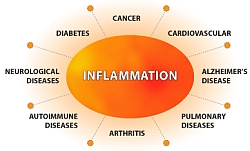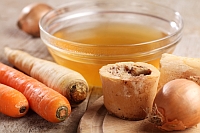Glutathione – Vital Protection for Your Body
 The first line of antioxidant protection for your body’s cells is glutathione (pronounced ‘gloota-thigh-own’). Glutathione, also known as GSH, has many important properties and functions that contribute to your health, the main function being to protect your cells from oxidative damage.
The first line of antioxidant protection for your body’s cells is glutathione (pronounced ‘gloota-thigh-own’). Glutathione, also known as GSH, has many important properties and functions that contribute to your health, the main function being to protect your cells from oxidative damage.
Oxidative stress
Let’s face it; we live in a toxic world. There are approximately 80,000 toxic industrial chemicals in our environment today! Electromagnetic fields (EMFs) are prevalent in our society. Common contributors to EMFs are electronics and the thousands of cell towers that have been introduced in just the last few decades.
Other toxins include heavy metals, herbicides, pesticides, fuel exhaust, household chemicals, pharmaceuticals, BPA, GMOs, and literally hundreds of additives in our foods. These all add oxidative stress to your body. Another word for oxidative stress is inflammation!
Tame inflammation with glutathione
Composed of three precursor amino acids, cysteine, glutamic acid and glycine, glutathione is manufactured by your body at the cellular level. It maintains the functions of the immune system and reduces inflammation. GSH is considered the body’s master antioxidant and exists in almost every cell in your body. It is responsible for detoxification and free radical reduction.
One of its many functions is to protect the cells from environmental and chemical toxins. GSH repairs our DNA and protects our cells from oxidative stress. It has the ability to recycle other antioxidants such as vitamins C and E, thus extending their antioxidant life.
Unfortunately the production of glutathione diminishes as we age. Other factors that reduce GSH production include medications, poor diet, infections, and physical and mental stress. When glutathione levels are low, your liver’s ability to detoxify is impaired creating a vicious cycle of inflammation.
 Functions of glutathione
Functions of glutathione
Not only is GSH a potent antioxidant against toxins, it is also critical to your immune system to fight infections and help prevent cancer. Glutathione helps protect your brain from free radicals. It is an essential nutrient for optimal vision. And since the mitochondria of our cells require glutathione, every part of the body benefits! To keep up with your body’s needs, you’ll want a constant supply. Food is our natural source to boost production of glutathione.
Food sources of glutathione
Certain fruits and vegetables contain naturally occurring glutathione. These foods should be consumed raw since heat degrades GSH. Some studies show that avocados contain more glutathione than other foods, although asparagus, squash, spinach and melons also have appreciable amounts. GSH is present in raw dairy, but is negligible in pasteurized dairy products.
Boost production of glutathione with foods
Consuming foods high in glutathione is a good start. However digestion breaks down most dietary glutathione and may not even enter your body’s cells. Better to consume foods that enable the body to make endogenous glutathione. Production of GSH requires selenium, vitamin D and magnesium. These nutrients are often deficient in many diets:
- Selenium: The trace mineral selenium is necessary to help form glutathione. Be sure to include selenium rich foods such as fish, grass fed meat, liver and dairy, as well as pasture raised poultry and eggs. Garlic is selenium rich. Brazil nuts are very high in selenium and should only be eaten occasionally, and in small amounts to avoid selenium toxicity.
- Glutamic acid: Not to be confused with monosodium glutamate (MSG), glutamic acid is widely available in meat, poultry, fish, eggs and dairy products.
- Cysteine: Cysteine is the sulfur-rich amino acid that is the key for building glutathione. To help boost your glutathione levels, be sure to eat foods that are rich in sulfur containing amino acids, such as raw eggs (farm-fresh from pasture-raised chickens), onions and garlic. Cruciferous vegetables such as broccoli, cauliflower, kale and cabbage are rich in cysteine and should be consumed.
- Glycine: Sources of glycine are: fish, meat, beans and dairy.
 A high concentration of glycine is found in collagen from cartilage-rich bones.
A high concentration of glycine is found in collagen from cartilage-rich bones.
Organic bone broth made from these bones provides the glycine necessary for glutathione production. In addition to glycine, bone broth contributes an abundance of minerals, including magnesium.
Eat your veggies – fermented of course!
You know that cultured vegetables are good for a healthy gut. But did you know that fermented vegetables are a wonderful booster for your body to make glutathione?
Cabbage used to make sauerkraut is a sulfur rich vegetable. GSH precursors in beets provide liver and gallbladder support and help with detoxification. Cultured vegetables assimilate and enhance antioxidant vitamins C, D and E.
Do you enjoy making your own raw cultured veggies? Good news! When you use a starter culture specific to vegetables that contains Lb. plantarum you ramp up the glutathione production!
Disclaimer: These statements have not been evaluated by the Food and Drug Administration. These products are not intended to diagnose, treat, cure, or prevent any disease.
Information provided in this article is not designed to and does not provide medical advice, professional diagnosis, opinion, treatment, or services to you or to any other individual. This is general information for educational purposes only. The information provided is not a substitute for medical or professional care, and you should not use the information in place of a visit, call, consultation, or the advice of your physician or other healthcare provider. Wise Choice Marketing Inc is not liable or responsible for any advice, course of treatment, diagnosis, or any other information, services, or product you obtain through Wise Choice Marketing Inc.


 Loading... Please wait...
Loading... Please wait...













